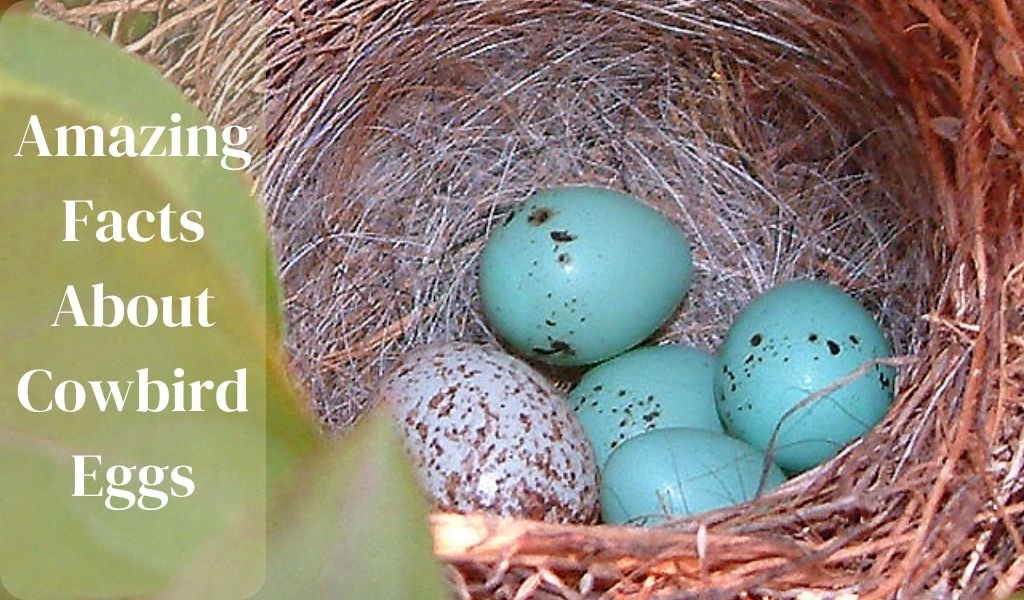Have you ever heard about cowbird eggs? These tiny eggs have some fascinating facts that will make you go wow. Nature has a way of surprising us with its wonders, and one such marvel is the fascinating world of cowbird eggs. These birds are known for their clever trick of laying their eggs in other bird’s nests. Join us on a journey to discover the incredible facts about cowbird eggs and the unique stories they tell.
Also Read: 6 Ugly Monkeys: Fascinating Facts
Brood Parasites
Cowbirds are known as brood parasites. Instead of building their own nests, they opt for a more cunning approach by laying their eggs in the nests of other bird species. This sneaky behaviour helps them avoid the responsibilities of raising their own chicks and leaving the host parents to care for their chicks.
Wide Range of Hosts
Cowbirds do not pick favorites when it comes to hosts. They lay their eggs in the nests of various bird species, from small songbirds to larger birds, like sparrows, robins, and warblers, leaving the hosts to care for their eggs and chicks.
Distinctive Colors
Cowbird eggs stand out with their smooth, shiny shells, varying in color from pale blue to greenish or even white. Each egg is a tiny masterpiece showcasing nature’s diversity. This diversity helps them blend in with the eggs of different host species.
Egg Size Matters
Cowbird eggs are typically larger than those of their host birds. Despite this size difference, the host birds often accept and incubate the cowbird eggs alongside their own.
Quick Egg Laying
Female cowbirds are fast egg layers. They can deposit their eggs in a host nest in less than 20 seconds and allowing her to swiftly deposit her eggs in different nests, reducing the chances of being caught in the act.
Nest Inspection
Host birds may inspect their nests regularly. However, cowbird eggs often escape detection because they closely resemble the host’s own eggs.
Rapid Incubation
Cowbird eggs have a shorter incubation period compared to the eggs of many host birds. This means that the cowbird chick hatches sooner, gaining a competitive edge for food and attention from the host parents.
No Parental Care
Unlike host bird parents who diligently care for their eggs and chicks, cowbirds show no interest in raising their offspring. Once the egg is laid, the cowbird parent leaves the responsibility to the unwitting host.
Aggressive Nest Defence
Some host birds have evolved to recognise cowbird eggs and will aggressively remove them from their nests to protect their own eggs. This ongoing evolutionary battle showcases the constant struggle between brood parasites and their hosts.
Learning from Experience
Female cowbirds often learn from their mistakes. If a host bird rejects their egg, they may change their strategy in the future, selecting different hosts or refining their egg-laying techniques.
No Parental Care
Unlike host bird parents who diligently care for their eggs and chicks, cowbirds show no interest in raising their offspring. Once the egg is laid, the cowbird parent leaves the responsibility to the unwitting host.
Chick Independence
Once hatched, cowbird chicks are quick learners and highly independent. They often outcompete their nestmates, ensuring their survival in the challenging world of the nest.
Social Learning
Young cowbirds learn about their identity and behaviours from the foster parents, imitating the calls and habits of the host species.
Conclusion
Cowbird eggs are not just ordinary bird eggs, they are part of a fascinating survival strategy that involves tricking other birds into raising their young. These tiny eggs play a crucial role in the intricate web of nature, showcasing the diversity and complexity of the avian world. The next time you spot a nest with unusual eggs, you might just be witnessing the cunning work of a cowbird.
